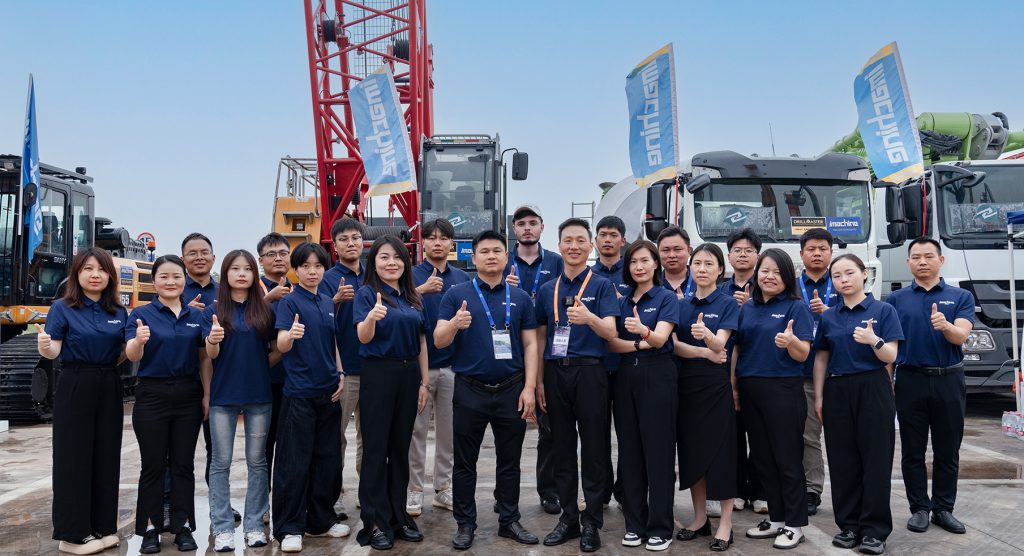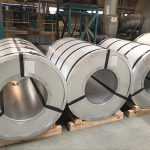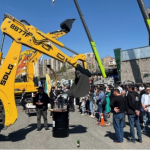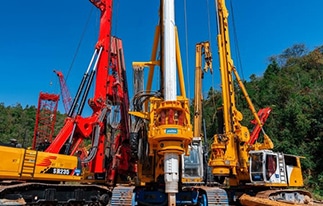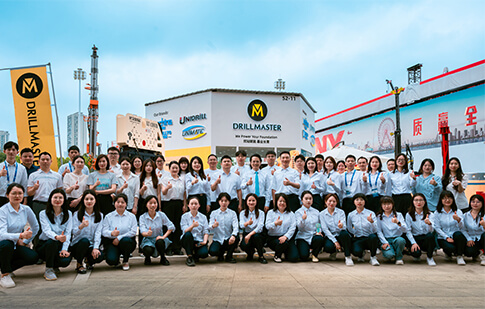
China Used Construction Machinery Exports have surged in recent years. Its extensive domestic market and strong industrial base made it a key source of affordable alternatives to brand-new equipment. However, beneath the surface of low prices and abundant options lies a disorganized, chaotic landscape, especially dangerous for buyers who lack a deep understanding of this market.
We’ve been working in this industry for years, seen how buyers, particularly those who are new or cost-sensitive, can easily fall into traps. Many thought they secured a great deal, only to find themselves dealing with hidden mechanical issues, delivery failures, or even complete scams. In many cases, what initially seemed like a bargain turned into a long and expensive lesson.
This article shares real cases and key facts about the problems in China’s used construction machinery exports. We don’t show pictures or name companies, just focus on useful information. The goal is to help buyers avoid common traps. If you’ve experienced something similar or have more information to share, you’re very welcome to contact us.
Chaos Hides Behind the Surge of China Used Construction Machinery Exports
1. Too many Non-Professional Traders
In recent years, as the global demand for used equipment has grown, a large number of non-industry trader or individuals have entered this market, many of them just want to make fast money without background in machinery, construction, or international trade.
This phenomenon is very common in China. The author can say with confidence that, as long as an industry in China shows profitable, everyone wants to jump in, even those without any real advantage or background. Further, given China’s population of 1.4 billion, the result is predictable. We won’t go into detail here.
Their strategy is simple, list machines they don’t own, collect inquiries, and hope to close deals quickly. When a customer shows interest, they scramble to locate an actual unit, often relying on third-party sources. These people rarely provide service, or proper documentation, and even disappear once the deal is done.
In some cases, they deliberately collect deposits before locating the machine, using excuses like “reserving for inspection” or “booking shipment.” If they fail to find a unit, refunds are slow or nonexistent.
Without basic product knowledge, these traders cannot answer technical questions, assess machine conditions, or support after-sale service. They’re not long-term players, they’re in for quick profit, and it’s the buyer who pays the price when things go wrong.
2. Lack of Regulation in the Market
Unlike the new equipment market. China’s second-hand market is still largely unregulated.
There are no unified grading systems, no third-party certification requirements, and no government-mandated inspections for most used machinery sales. Sellers are free to describe machines in vague or misleading terms, such as “90% new,” “excellent condition,” or “only repainted”. Without providing specific performance data or repair history.
This environment allows some sellers to hide major issues. For example:
- A machine with a cracked frame might be welded and painted to look intact.
- Engines near the end of their life might be temporarily tuned up for testing videos.
- Hydraulic leaks, electronic issues, and structural fatigue are often concealed.
Since buyers are usually overseas and rely on videos and images, these tricks are hard to detect remotely, especially without technical experience or on-site inspection.

3. Fake Information and Scams for China Used Construction Machinery Exports
Some sellers go beyond hiding details, they simply cheat on purpose.
- Change machine year (e.g., selling a 2012 model as a 2018)
- Edit hour meters
- Use videos or photos from other machines
- Hiding faults like non-original parts, missing unlock codes, or key components replaced
Real case example from one of our client:
A seller claimed an used SANY SR150 rotary drilling rig they promoted was from 2017. But that model was actually stopped from production after 2015. The machine was older and had just been refurbished or repainted.

4. Low Entry Barriers on Online B2B Platforms for China Used Construction Machinery Exports
Sites like Alibaba and Made-in-China allow almost anyone to list products. Here are links for Alibaba Seller Registration and Made-in-China: Join as a Seller
Many new “companies” show up every month, especially from big machinery centers like Shanghai, Guangdong Province, Shandong Province, and Hunan Province.
Anyone with a business license (even a micro-enterprise) can open a storefront and list machines, regardless of whether they own equipment or can fulfill orders.
For instance, in just the first half of 2024, imachine observed over 10 newly registered exporters from Changsha, known as “the heart of China’s machinery hub”, pop up on Alibaba.
Common issues probably exist:
- Deposit scams: Asking for payment before inspections, then delaying or disappearing.
- Paperwork problems: Errors in shipping documents, especially under L/C (Letter of Credit), resulting in delays, rejected shipments, or fines.
- False after-sales claims: Promises of technical support, training, or warranty that don’t exist in practice. (By the way, the Chinese used construction machinery industry usually doesn’t have a warranty)Often, “after-sales service” just means a basic wash and a coat of paint.
When these issues arise, language barriers, legal gaps, and international enforcement challenges make it difficult for buyers to seek justice.
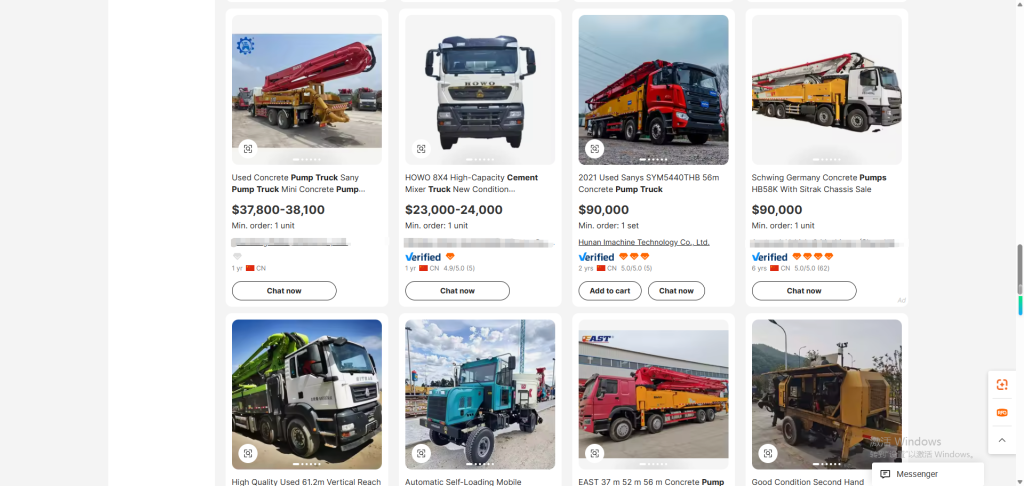
Real Cases We have Seen
Case 1: Excavator Switch Scam at a Machinery Center
At the entrance of a well-known used excavator hub in China, a giant notice board is placed, specifically warning foreign buyers to supervise the container loading and sealing process. The message is clear: some sellers may swap your machine after payment but before shipment.
This speaks volumes about how common bait-and-switch tactics have become, even in highly visible trade centers.
Case 2: Crawler Crane Locked in Abu Dhabi
One of our clients in Abu Dhabi purchased a 55-ton crawler crane from a seller who claimed it was “ready to work.” However, just days after arrival, the machine was remotely locked by the original manufacturer due to an incomplete software unlock.
The unlocking cost was high, involving licensing and technical assistance from China, and the process took weeks. During that time, the machine sat idle, and the client’s project was delayed, incurring heavy penalties.
Case 3: Steel Sheet Pile Scam — $180,000 Loss
Though not a machine, this case reflects a similar issue in the second-hand construction materials market.
A client ordered 400 tons of steel sheet piles from a company called “Shandong Shangang Group,” paying the full $180,000 upfront. The seller never shipped the goods. Later, we helped investigate and found the company had just ¥280,000 real capital (~$40,000 USD)
Despite our support with arbitration, the funds were likely unrecoverable.
Case 4: Different Machine Sent in China Used Construction Machinery Exports
A Middle Eastern client was shown a clean, well-maintained concrete pump via video. After payment and delivery, the actual machine was heavily damaged, with a broken boom and engine issues. It was clearly a different unit — a classic bait-and-switch.
How to Protect Yourself When Importing Used Equipment from China
1. Research Market Prices
Always compare prices with market benchmarks. If the offer is far below average, it’s probably too good to be true.
Take the new steel sheet pile case I mentioned before as an example:
- At ~$310/ton for just the scrap steel (Chinese market average price), 400 tons already cost over $123,000.
- Add $30,000–40,000 in logistics, and you’re at ~$160,000 just for a scrap steel.
- Anyone quoting $180,000 for the brand new steel sheet pile including profit? Impossible.
2. Request Serial Numbers and Ownership Documents
Ask the seller to provide:
- Clear photos or videos of the machine with visible serial numbers
- Ownership proof (e.g., invoices, transfer certificates)
- Any service or repair history available
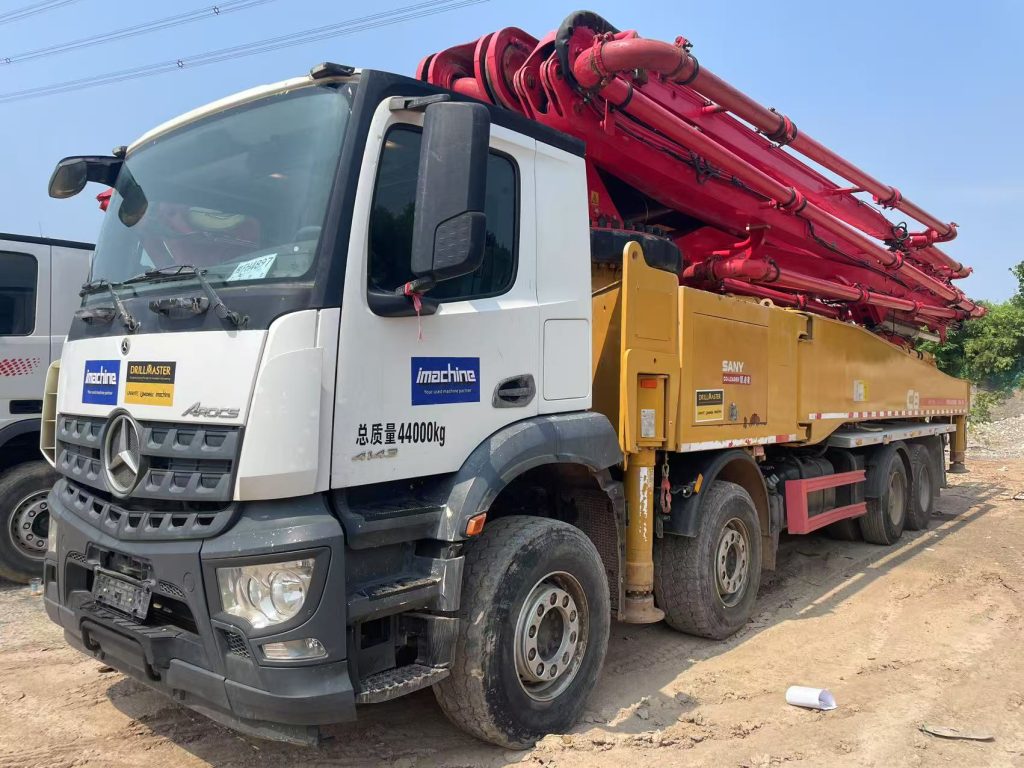
3. Avoid High Prepayments
If you don’t fully trust the seller:
- Use step-by-step payments
- Prefer L/C, PayPal escrow, or local agents to hold funds
- Avoid paying 100% upfront unless you’re absolutely certain
4. Arrange On-site or Third-Party Inspection
- Visit China yourself, if possible
- Or use trusted local inspection companies such as SGS Inspection Services or TÜV Rheinland with a strong track record.
This helps confirm the real condition, serial numbers, and ownership status before shipping.
5. Choose Sellers with Long-Term Reputation
Work with suppliers who:
- Have a physical address and export license
- Share real case studies and customer references
- Are transparent in communication and contract terms
These companies are more likely to value their reputation.
Summary of Common Scams in China Used Machinery Export Market
- Fake equipment year or hours (tampered meters, repainted surfaces)
- Non-existent stock (machines listed but not owned)
- Bait-and-switch tactics (different machine shipped)
- Misleading photos/videos (outdated, edited, or irrelevant)
- Hidden technical issues (cracks, leaks, worn-out parts)
- Fake brands/components (non-OEM or counterfeit items)
- Contract ambiguity or lack of contract (zero legal protection)
Why We Share This
We are not trying to scare you, just simply believe it’s time to raise awareness. Attacking competitors is not our purpose. We want buyers to understand the risks, ask the right questions, and protect themselves.
By publishing this article, we may face criticism or even resistance from others in the industry, because we are exposing problems that some prefer to keep hidden. But we believe it’s more important to do the right thing, and to speak up for honest business and long-term trust.
This article represents our real observations from the front lines of the industry. If it helps even one customer avoid a bad deal, it’s worth sharing.
